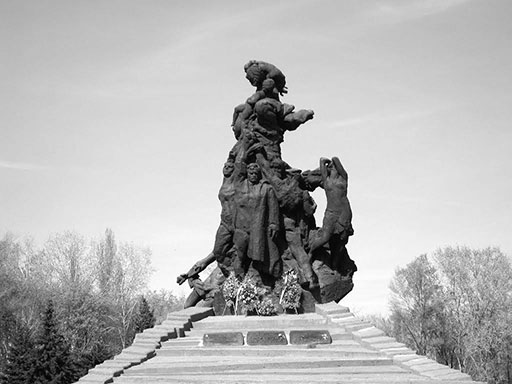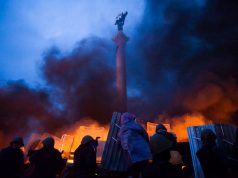The anniversary attracted elites from across Europe and around the world, with Ukraine’s politicians recognizing the need to properly mark the massacre to break from the Soviet version of its history. Challenging those distortions has become increasingly important in the context of de-communization.
President Poroshenko joined European Union President Donald Tusk, nine survivors and dignitaries from around the world on the evening of September 29th, to commemorate the 75th anniversary of the largest Nazi massacre of Soviet Jews. The Babyn Yar massacres were not the only massacre of their kind committed on Ukrainian territory, but they have become symbolic of the “holocaust by bullets” practiced in Eastern Europe by Nazi occupiers.
Almost 34,000 men, women and children were stripped naked and shot in a ravine outside of Kyiv between 28 and 29 September of 1941. Groups of ten were told to undress and ushered into the gully before being executed with machine guns. Thousands waited in line behind them, out of earshot and paralyzed by fear.
“The tragedy of the Babyn Yar is a wake-up call for the whole humanity,” said Mr. Poroshenko. “Any regime, which tramples human rights and freedoms, embodies a threat to the very humanity. That is why our solidarity today against Russian aggression is an investment in the security and prosperity of a common and united Europe.”
German soldiers detonated explosive devices to collapse the ravine walls when the massacre was over. Dead and wounded were buried alike. Survivors at the event described their experiences – some had survived the crush of bodies and earth, clambered out under cover of darkness and dodged Nazi searchlights to escape through the surrounding woods.
The Wehrmacht captured Kyiv ten days before the massacre, but its advancing forces were caught out by a series of timed explosives left by retreating Red Army forces. Blaming the attack on the city’s Jewish population, the city’s military governor, SS and police decided to kill them all. The Jews of Kyiv were ordered to report to the designated sites with their valuables and documents, before being shepherded into the kill zone through a corridor of armed guards.
The occupiers continued to use the site as a mass grave throughout the war, slaughtering as many as 150,000 Soviet soldiers, Jews, Ukrainian nationalists, Roma and people with disabilities before Soviet forces retook Kyiv in December 1943. Often they were aided by local Ukrainian collaborators, a fact which is still bitterly contested in contemporary Ukraine.
“Many of these crimes were committed by Ukrainians,” Israeli President Reuven Rivlin reminded Ukrainian lawmakers on 27 September during a special secession of the Verhovna Rada devoted to the anniversary, before cutting short his trip to attend the funeral of his predecessor, former Israeli President and Prime Minister Shimon Peres.”They victimized the Jews, killed them, and in many cases reported them to the Nazis.”
In contrast with previous governments, who largely downplayed the anti-Semitic nature of the killings and focused on the murder of Soviet or nationalist troops, the Poroshenko administration has helped the raise the profile of Babyn Yar’s Jewish victims.
“This conference is an incredibly important opportunity for Ukraine to come to terms with its difficult past. Babyn Yar was one of Second World War’s earliest instances of the “Holocaust by bullets,” explained Peter Zalmayev, Outreach Coordinator for Ukrainian-Jewish Encounter International and a board member of the American Jewish Committee. His Canada-based NGO organized many of the week-long activities and events.
“By honoring the massacred Kyivan Jews as the primary and main victims at Babyn Yar, Ukraine is making the necessary corrective to the Soviet crime of omission, whereby the victims’ ethnic identity was left vague.”




































